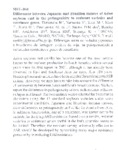Use este identificador para citar ou linkar para este item:
http://www.alice.cnptia.embrapa.br/alice/handle/doc/471588| Título: | Differences between Japanese and Brazilian isolates of Asian soybean rust in the pathogenicity to resistant varieties and resistance genes. |
| Autoria: | YAMANAKA, N.  YAMAOKA, Y.   KATO, M.   MORI, T.   KUDO, H.   PASSIANOTTO, A. L. de L.   SANTOS, J. V. M. dos   BENITEZ, E. R.   ABDELNOOR, R. V.   SOARES, R. M.   SUENAGA, K.   |
| Afiliação: | NAOKI YAMANAKA, JIRCAS; YUICHI YAMAOKA, University of Tsukuba; MASAYASU KATO, JIRCAS/NARO; JIRCAS; JIRCAS; ANDRÉ LUIZ DE LIMA PASSIANOTTO; JOÃO VITOR MALDONADO DOS SANTOS; NICS; RICARDO VILELA ABDELNOOR, CNPSO; RAFAEL MOREIRA SOARES, CNPSO; JIRCAS. |
| Ano de publicação: | 2008 |
| Referência: | Tropical Plant Pathology, Brasília, DF, v. 33, p. S 200, ago. 2008. Suplemento. |
| Conteúdo: | Asian soybean rust (ASR) has become one of the most serious threats to the soybean production in South America within several years since its first report in 2001, although it has already been observed in East and Southeast Asia for more than 100 years. Breeding lines and varieties have been selected for resistance to ASR in Asia. However, we may have to take into account the difference of pathogenicity between Asian and South American rusts. We here report the difference in pathogenicity of two bulk isolates collected in Japan and Brazil. The two isolates were evaluated for 5 resistance characters using the 13 standard soybean varieties under same experimental condition. Japanese and Brazilian isolates showed clear differences in pathogenicity in 8 of the 13 standard varieties. In addition, lesion color, one of 5 resistance, was shown not to be suitable for deciding ARS. Based on our results, resistant varieties or resistance genes useful in the both countries seems to be limited. Therefore, the resistant variety universally effective to ARS should be developed by pyramiding many major resistance genes or by introducing field resistance. |
| Thesagro: | Soja |
| Notas: | Edição dos Resumos apresentado no XLI Congresso Brasileiro de Fitopatologia, Belo Horizonte, ago., 2008. |
| Tipo do material: | Artigo de periódico |
| Acesso: | openAccess |
| Aparece nas coleções: | Artigo em periódico indexado (CNPSO)  |
Arquivos associados a este item:
| Arquivo | Descrição | Tamanho | Formato | |
|---|---|---|---|---|
| DifferencesbetweenJapaneseandBrazilianisolatesofAsiansoybeanrustinthepathogenicitytoresistantvarietiesandresistancegenes.pdf | 245,47 kB | Adobe PDF |  Visualizar/Abrir |









